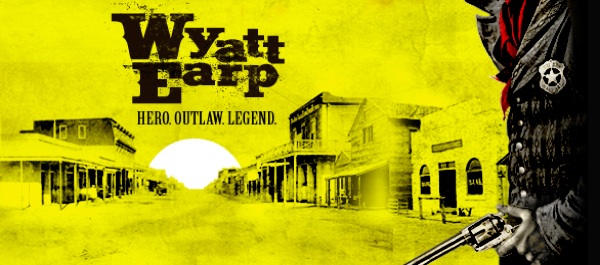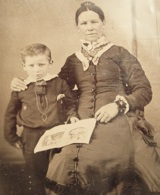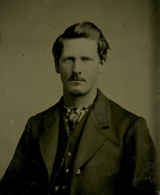
Wyatt Earp, Wyatt Earp
Brave, courageous and bold
Long live his fame and long live his glory
And long may his story be told.
So goes the theme song to the 1955–61 television western about the famous Western lawman, Wyatt Earp. It was a signpost in the life of a legend that became larger than the man, a statement that after his death the popularity of the frontier roamer greatly increased. Death has a way of injecting itself into stories of the Old West—it was a theme associated with Earp during his life and afterwards. Now American Experience adds the story to its documented tales of the Wild West. “Wyatt Earp” premieres at 9:00 pm Eastern time, January 25th, on PBS.
Wyatt Earp’s fame as a lawman in Kansas and in Tombstone, Arizona, is the part of the story that most people are familiar with, but a greater part of Earp’s life was spent searching for a future different from his past. Indeed, as Wyatt, his mother and four brothers were dragged across the West from Illinois to California by his father, Wyatt was not a happy child. Earp’s upbringing would play a great role in his life decisions according to Rob Rapley—writer, producer and director for the American Experience documentary.
 “It was certainly a very difficult home environment. His father was very hard on his sons and other people; he was a drinker, a bit of a n’er do well. That really tightened the bonds between brothers, particularly between Wyatt and Morgan. Wyatt’s older brothers go away to the Civil War and Wyatt’s left as the oldest child at home with a borderline abusive father, and I think he really looks after his younger brothers in that situation. They’re traveling around all over the country and it’s only natural that they don’t form a lot of other attachments and they really develop very close and strong ties between the brothers. It’s also remarkable that they follow each other, that they all are rather footloose and they tend to end up in the same places.”
“It was certainly a very difficult home environment. His father was very hard on his sons and other people; he was a drinker, a bit of a n’er do well. That really tightened the bonds between brothers, particularly between Wyatt and Morgan. Wyatt’s older brothers go away to the Civil War and Wyatt’s left as the oldest child at home with a borderline abusive father, and I think he really looks after his younger brothers in that situation. They’re traveling around all over the country and it’s only natural that they don’t form a lot of other attachments and they really develop very close and strong ties between the brothers. It’s also remarkable that they follow each other, that they all are rather footloose and they tend to end up in the same places.”
James and Virgil joined the Union army in 1861. Wyatt wanted to go off to war too but was too young. With the end of the war the Earps were among those experiencing a rapidly changing West, as progress that had developed slowly across the frontier suddenly expanded exponentially in post-war prosperity. At 17, Wyatt left home and, beginning in Southern California, worked his way across the country doing odd jobs on the railroad until he ended up in Lamar, Missouri, where his father was then living with Virgil and Morgan.
Tall, handsome, with blond hair and blue eyes, Wyatt Earp seemed to have a promising life ahead of him as he entered his 20s. He became a town constable in Lamar and married the daughter of a local hotelier. But when his young wife, then pregnant, died suddenly of typhoid his life unraveled. He started roaming again and picked up his association with the seeder side of life in the West. He engaged in petty crimes, spent time in jail, consorted with prostitutes and became a thug for hire. When bother James opened a brothel in Kansas, Wyatt drifted to Wichita and continued working as a bouncer and enforcer until by chance he got the opportunity to assist an off-duty lawman in capturing some thieves.
 The incident was written up in the newspaper and it was a turning moment in Wyatt’s life. In Kansas he hired on as a deputy marshal in Wichita and Dodge City when the cowboys came to town in the summer. He was now on the other side of the law, even though law enforcement was still tricky business in the West. Keeping the cowboys out of trouble while railhead businesses emptied the cowpokes’ pockets forced these deputies to walk a fine line in their jobs. But with the position, Earp saw something he liked, as Rob Rapley points out.
The incident was written up in the newspaper and it was a turning moment in Wyatt’s life. In Kansas he hired on as a deputy marshal in Wichita and Dodge City when the cowboys came to town in the summer. He was now on the other side of the law, even though law enforcement was still tricky business in the West. Keeping the cowboys out of trouble while railhead businesses emptied the cowpokes’ pockets forced these deputies to walk a fine line in their jobs. But with the position, Earp saw something he liked, as Rob Rapley points out.
“It (Wyatt’s ambition) manifests itself in different ways, but Wyatt is always running from his youth, and especially that period when he’s kind of a low-level criminal, when he’s put in jail and arrested for horse theft and so on … whorehouse bouncer … he’s always running from that. He wants to be included, he wants to be recognized. And that takes several forms. Money is obviously one form … power, recognition. He is fascinated by powerful men, wants to attach himself to them, or at least hitch his wagon to theirs. I think it’s just different versions of the same ambition. Wyatt Earp never belonged anywhere, and he wants to be on the inside. And whether it takes money or power or authority, whatever it is, that’s what he wants.”
[continued on next page]




